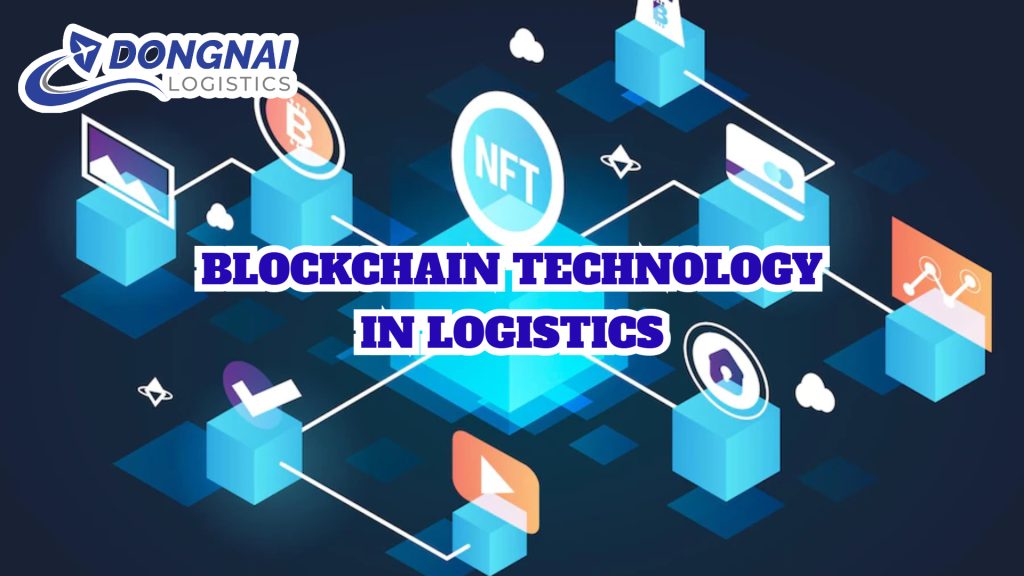THE IMPACT OF BLOCKCHAIN TECHNOLOGY ON THE LOGISTICS INDUSTRY
In recent years, blockchain technology has emerged as a prominent trend across various industries. From finance and banking to healthcare, blockchain has proven its influence. Particularly, this technology is driving major changes in the logistics sector. Blockchain offers enhanced security, transparency, and the ability to track every transaction. These features help improve efficiency and reduce costs in logistics operations. Moreover, it increases transparency across all operational processes. This article will explore the impact of blockchain on logistics and how it is transforming traditional operational models.

What Is Blockchain Technology?
Blockchain is a decentralized database technology that records every transaction in blocks. These blocks are linked together in a chain, forming an immutable system. The blocks are stored on multiple computers, ensuring high levels of transparency and security. One key feature of blockchain is the immutability of its data. Once recorded, the information cannot be altered or deleted. Any changes must be approved through network consensus. This makes blockchain a highly reliable and secure technology.
Why Is Blockchain Technology Important in the Logistics Industry?
The logistics sector involves complex operations and multiple stakeholders, including suppliers, carriers, and customers. This demands an efficient information management system. Blockchain brings clear benefits by improving workflows and optimizing operations.
-
Enhanced Transparency and Reduced Fraud Risk
A common issue in logistics is the lack of transparency in transactions and processes. Information about routes, cargo status, and changes is often delayed or falsified. Blockchain addresses this by providing a permanent record of all transactions. These records are easily verifiable and traceable. Every step in the supply chain is recorded and cannot be altered, which reduces fraud risks and protects stakeholders’ interests.
-
Improved Transport Management and Cost Reduction
Blockchain allows transport companies to track shipments in real time and verify their exact location. Stakeholders such as manufacturers, distributors, and customers can access this data easily. This minimizes delays and prevents goods from getting lost. Additionally, blockchain reduces the need for complex paperwork and data entry errors. It also cuts down administrative costs, thereby improving operational efficiency.
-
Streamlined Payment Processes
Payments in logistics are often complicated, with long payment cycles, high transaction fees, and difficulty verifying transactions. Blockchain optimizes payment processes using smart contracts that automate and enforce payment conditions once contract terms are fulfilled. This allows stakeholders to complete payments more quickly and accurately, reducing disputes and transaction costs.
-
Enhanced Inventory and Warehouse Management
Blockchain helps companies manage inventory and storage more efficiently by providing real-time information on the quantity and location of goods. This minimizes phantom inventory, optimizes ordering processes, and reduces operational costs. With transparent tracking across the supply chain, businesses can quickly identify storage or transportation issues and improve service quality.
Specific Applications of Blockchain Technology in Logistics
-
Shipment Tracking
Blockchain can track each package from the warehouse to the customer. Every step in the shipping process is recorded on the blockchain, ensuring no stage is omitted or falsified. This system allows stakeholders to monitor shipment status throughout the delivery journey, reducing the risk of loss or damage.
-
Contract Automation
Smart contracts are one of the key applications of blockchain in logistics. These contracts automate the execution of agreements once predefined conditions are met. This reduces the time and costs associated with traditional contracts and minimizes legal disputes.
-
Port and Warehouse Management
Ports and warehouses are crucial components in the logistics supply chain. Blockchain can enhance the efficiency of these facilities by providing accurate data on the status of vessels, containers, and cargo. This helps ports and warehouses better manage the flow of goods, reduce congestion, and improve utilization.

Challenges in Implementing Blockchain Technology in Logistics
While blockchain offers many benefits, implementing this technology in logistics is not without difficulties. Some challenges that logistics companies may face include:
Initial Investment Costs
Implementing blockchain systems requires significant investment in IT infrastructure and staff training.
Compatibility with Legacy Systems
Many logistics companies still rely on traditional management systems, and integrating blockchain with these systems can be challenging.
Regulatory Issues
Blockchain regulations and policies are still evolving and incomplete, which may hinder widespread adoption of the technology.
THE IMPACT OF BLOCKCHAIN TECHNOLOGY ON THE LOGISTICS INDUSTRY
Blockchain presents vast opportunities for the logistics industry. It enhances transparency, reduces costs, and improves operational efficiency. Despite implementation challenges, blockchain offers substantial advantages and is poised to transform logistics in the future. Businesses should proactively research and adopt blockchain to optimize their processes and stay competitive.
Read more:
Vận tải biển: Xương sống của chuỗi cung ứng toàn cầu
Vải Vận Chuyển Từ Đồng Nai Sang Phần Lan Bằng Đường Biển
Vận chuyển hàng hóa từ Đồng Nai đi Phú Quốc
Chuyển phát nhanh từ Quảng Ninh đến Đồng Nai chất lượng, uy tín, giá cạnh tranh

